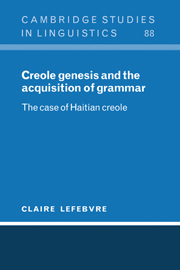Book contents
- Frontmatter
- Contents
- Tables
- Preface
- Abbreviations
- 1 The problem of creole genesis and linguistic theory
- 2 Cognitive processes involved in creole genesis
- 3 The research methodology
- 4 Functional category lexical entries involved in nominal structure
- 5 The preverbal markers encoding relative Tense, Mood and Aspect
- 6 Pronouns
- 7 Functional category lexical entries involved in the structure of the clause
- 8 The determiner and the structure of the clause
- 9 The syntactic properties of verbs
- 10 Are derivational affixes relexified?
- 11 The concatenation of words into compounds
- 12 Parameters
- 13 Evaluation of the hypothesis
- 14 Theoretical consequences
- Appendices
- Notes
- References
- Index of authors
- Index of languages and language families
- Index of subjects
14 - Theoretical consequences
Published online by Cambridge University Press: 23 November 2009
- Frontmatter
- Contents
- Tables
- Preface
- Abbreviations
- 1 The problem of creole genesis and linguistic theory
- 2 Cognitive processes involved in creole genesis
- 3 The research methodology
- 4 Functional category lexical entries involved in nominal structure
- 5 The preverbal markers encoding relative Tense, Mood and Aspect
- 6 Pronouns
- 7 Functional category lexical entries involved in the structure of the clause
- 8 The determiner and the structure of the clause
- 9 The syntactic properties of verbs
- 10 Are derivational affixes relexified?
- 11 The concatenation of words into compounds
- 12 Parameters
- 13 Evaluation of the hypothesis
- 14 Theoretical consequences
- Appendices
- Notes
- References
- Index of authors
- Index of languages and language families
- Index of subjects
Summary
The fact that it can be demonstrated that relexification plays a role in the formation of various types of languages (e.g. mixed languages, pidgins, creoles) argues that this is a process available to human cognition. It is a means of creating new languages in a relatively short time. It may apply to part of the lexicon, as in mixed languages, or the entire lexicon, as in pidgin and creole languages. Whether it applies to part of the lexicon or the whole lexicon depends on the motivation for creating a new language and the overall situation in which the process takes place. As we saw in chapter 2, mixed languages are created in bilingual communities with the motivation of creating an in-group language. By contrast, pidgin and creole languages are created in multilingual communities with the purpose of easing communication between groups that do not have a common language, whence the necessity to relexify the whole lexicon. As a cognitive process, however, relexification is independent from the various contexts in which it applies. The fact that it exists and the very nature of the process support Sproat's (1985) and Pranka's (1983) proposal that phonological representations are stored independently in the brain.
The nature of relexification, and the facts that it is available to human cognition and is effectively used in the rapid creation of new languages, have consequences for the theory of the transmission and acquisition of lexicons in situations where new languages, like creoles, are formed.
- Type
- Chapter
- Information
- Creole Genesis and the Acquisition of GrammarThe Case of Haitian Creole, pp. 395 - 396Publisher: Cambridge University PressPrint publication year: 1999



